The Energy Company Business Model and the European Green Deal
Abstract
1. Introduction
1.1. Traditional Business Models
1.2. Business Model Innovation
1.3. Sustainable Business Models
1.4. European Green Deal and the Operation of Energy Companies
2. Materials and Methods
- -
- What is the significance of the European Green Deal for the business model of the studied energy company?
- -
- Which elements of the business model of the studied energy company take the form of sustainable ones?
- -
- In what direction is the business model of the energy company evolving?
- -
- Economic regulations in the area of the European Green Deal lead to changes in the business model of the studied energy company,
- -
- The studied energy company through the implementation of sustainable business practices aims to achieve sustainable production.
3. Results
4. Discussion
5. Conclusions
Funding
Institutional Review Board Statement
Informed Consent Statement
Data Availability Statement
Conflicts of Interest
References
- Teece, D.J. Business Models, Business Strategy and Innovation. Long Range Plan. 2010, 43, 172–194. [Google Scholar] [CrossRef]
- Osterwalder, A.; Pigneur, Y.; Tucci, C.L. Clarifying Business Models: Origins, Present, and Future of the Concept. CAIS 2005, 16, 1. [Google Scholar] [CrossRef]
- Baden-Fuller, C.; Mangematin, V. (Eds.) Introduction: Business Models and Modelling Business Models. In Advances in Strategic Management; Emerald Group Publishing Limited: Bingley, UK, 2015; Volume 33, pp. xi–xxii. ISBN 978-1-78560-463-8. [Google Scholar]
- Sun, S.L.; Xiao, J.; Zhang, Y.; Zhao, X. Building Business Models through Simple Rules. MBR 2018, 26, 361–378. [Google Scholar] [CrossRef]
- Rayna, T.; Striukova, L. 360° Business Model Innovation: Toward an Integrated View of Business Model Innovation: An Integrated, Value-Based View of a Business Model Can Provide Insight into Potential Areas for Business Model Innovation. Res.-Technol. Manag. 2016, 59, 21–28. [Google Scholar] [CrossRef][Green Version]
- Geissdoerfer, M.; Vladimirova, D.; Evans, S. Sustainable Business Model Innovation: A Review. J. Clean. Prod. 2018, 198, 401–416. [Google Scholar] [CrossRef]
- Bocken, N.M.P.; Short, S.W.; Rana, P.; Evans, S. A Literature and Practice Review to Develop Sustainable Business Model Archetypes. J. Clean. Prod. 2014, 65, 42–56. [Google Scholar] [CrossRef]
- Osterwalder, A.; Pigneur, Y.; Clark, T. Business Model Generation: A Handbook for Visionaries, Game Changers, and Challengers; Wiley: Hoboken, NJ, USA, 2010; ISBN 978-0-470-87641-1. [Google Scholar]
- Aagaard, A. Identifying Sustainable Business Models Through Sustainable Value Creation. In Sustainable Business Models. Innovation, Implementation and Success; Aagaard, A., Ed.; Palgrave Macmillan: Cham, Switzerland, 2019; pp. 1–24. [Google Scholar]
- Slávik, Š.; Bednár, R. Analysis of Business Models. JOC 2014, 6, 19–40. [Google Scholar] [CrossRef]
- Falencikowski, T.; Nogalski, B. Przechwytywanie Wartości w Modelu Biznesu Sieci Przedsiębiorstw—Osnowa Teoretyczna i Przypadki Praktyczne. In Zarządzanie Strategiczne. Strategie Sieci i Przedsiębiorstw w Sieci; Krupski, R., Ed.; Prace Naukowe Wałbrzyskiej Wyższej Szkoły Zarządzania i Przedsiębiorczości; Wałbrzyska Wyższa Szkoła Zarządzania i Przedsiębiorczości: Wałbrzych, Poland, 2015; Volume 32, pp. 109–120. [Google Scholar]
- Fielt, E. Conceptualising Business Models: Definitions, Frameworks and Classifications. J. Bus. Models 2014, 1, 85–105, Inaugural issue. [Google Scholar] [CrossRef]
- Schiavi, G.S.; Behr, A. Emerging Technologies and New Business Models: A Review on Disruptive Business Models. INMR 2018, 15, 338–355. [Google Scholar] [CrossRef]
- Stelmaszczyk, M.; Pierścieniak, A.; Krzysztofek, A. Managerial Energy in Sustainable Enterprises: Organizational Wisdom Approach. Energies 2021, 14, 2367. [Google Scholar] [CrossRef]
- Peñarroya-Farell, M.; Miralles, F. Business Model Dynamics from Interaction with Open Innovation. JOItmC 2021, 7, 81. [Google Scholar] [CrossRef]
- Husin, S.S.; Rahman, A.A.A.; Mukhtar, D.; Nawi, N.C. A Systematic Literature Review on Business Model Innovation: Industrial, Methodology & Positioning Gaps. Int. J. Innov. 2020, 10, 20. [Google Scholar]
- Kringelum, L.B.; Normann Kristiansen, J.; Næs Gjerding, A. Business Model Implications of Industry Path Dependency. J. Bus. Models 2021, 9, 20–28. [Google Scholar] [CrossRef]
- Da Silva, C.M. From One Context to Another: How Business Models Emerge. J. Bus. Models 2021, 9, 8–12. [Google Scholar] [CrossRef]
- Panda, B.K. Application of Business Model Innovation for New Enterprises: A Case Study of Digital Business Using a Freemium Business Model. J. Manag. Dev. 2020, 39, 517–524. [Google Scholar] [CrossRef]
- Jonker, J.; Faber, N. Organizing for Sustainability: A Guide to Developing New Business Models; Springer International Publishing: Cham, Switzerland, 2021; ISBN 978-3-030-78156-9. [Google Scholar]
- Agwu, U.J.; Bessant, J. Sustainable Business Models: A Systematic Review of Approaches and Challenges in Manufacturing. Rev. Adm. Contemp. 2021, 25, e200202. [Google Scholar] [CrossRef]
- Wit, B.; Dresler, P.; Surma-Syta, A. Innovation in Start-Up Business Model in Energy-Saving Solutions for Sustainable Development. Energies 2021, 14, 3583. [Google Scholar] [CrossRef]
- Wells, P.E. Business Models for Sustainability; Edward Elgar Publishing: Cheltenham, UK, 2013; ISBN 978-1-78100-153-0. [Google Scholar]
- Larsson, M. The Business of Global Energy Transformation: Saving Billions through Sustainable Models; Springer: Berlin/Heidelberg, Germany, 2012; ISBN 978-1-137-02449-7. [Google Scholar]
- Freudenreich, B.; Lüdeke-Freund, F.; Schaltegger, S. A Stakeholder Theory Perspective on Business Models: Value Creation for Sustainability. J. Bus. Ethics 2020, 166, 3–18. [Google Scholar] [CrossRef]
- Wasserbaur, R.; Sakao, T. Analysing Interplays between PSS Business Models and Governmental Policies towards a Circular Economy. Procedia CIRP 2018, 73, 130–136. [Google Scholar] [CrossRef]
- Sommer, A. Managing Green Business Model Transformations; Springer Science & Business Media: Berlin/Heidelberg, Germany, 2012; ISBN 978-3-642-28848-7. [Google Scholar]
- Europejski Zielony Ład. Aspirowanie do Miana Pierwszego Kontynentu Neutralnego dla Klimatu. Available online: https://ec.europa.eu/info/strategy/priorities-2019-2024/european-green-deal_pl (accessed on 3 April 2022).
- Posner, R.A. Theories of Economic Regulation. Bell J. Econ. Manag. Sci. 1974, 5, 335–358. [Google Scholar] [CrossRef]
- Viscusi, W.K.; Harrington, J.E., Jr.; Sappington, D.E.M. Economics of Regulation and Antitrust, 5th ed.; MIT Press: Cambridge, MA, USA, 2018; ISBN 978-0-262-03806-5. [Google Scholar]
- Braunerhjelm, P.; Desai, S.; Eklund, J.E. Regulation, Firm Dynamics and Entrepreneurship. Eur. J. Law Econ. 2015, 40, 1–11. [Google Scholar] [CrossRef]
- Djankov, S.; La Porta, R.; Lopez-de-Silanes, F.; Shleifer, A. The Regulation of Entry. Q. J. Econ. 2002, 117, 1–37. [Google Scholar] [CrossRef]
- Europejski Zielony Ład. Available online: https://www.consilium.europa.eu/pl/policies/green-deal/ (accessed on 3 April 2022).
- Rozporządzenie Parlamentu Europejskiego i Rady (UE) 2021/1119 z Dnia 30 Czerwca 2021 r. w Sprawie Ustanowienia ram na Potrzeby Osiągnięcia Neutralności Klimatycznej i Zmiany Rozporządzeń (WE) nr 401/2009 i (UE) 2018/1999 (Europejskie prawo o klimacie); 2021; L. 243. Available online: https://eur-lex.europa.eu/legal-content/PL/TXT/?uri=OJ:L:2021:243:TOC (accessed on 2 April 2022).
- Czysta Energia. Available online: https://www.consilium.europa.eu/pl/policies/clean-energy/ (accessed on 3 April 2022).
- Ministerstwo Energii Krajowy Plan Na Rzecz Energii i Klimatu Na Lata 2021–2030. Założenia i Cele Oraz Polityki i Działania. PROJEKT—w. 3.1 z 04.01.2019. Available online: https://energy.ec.europa.eu/system/files/2019-02/poland_draftnecp_0.pdf (accessed on 29 March 2022).
- Obwieszczenie Ministra Klimatu I Środowiska z Dnia 2 Marca 2021 r. w Sprawie Polityki Energetycznej Państwa Do 2040 r. Monitor Polski. Dziennik Urzędowy Rzeczypospolitej Polskiej, Warszawa, Dnia 10 Marca 2021 r. Poz. 264, Załącznik. Available online: https://isap.sejm.gov.pl/isap.nsf/download.xsp/WMP20210000264/O/M20210264.pdf (accessed on 30 March 2022).
- Perissi, I.; Jones, A. Investigating European Union Decarbonization Strategies: Evaluating the Pathway to Carbon Neutrality by 2050. Sustainability 2022, 14, 4728. [Google Scholar] [CrossRef]
- Metody Badań Jakościowych; Denzin, N.K., Lincoln, Y.S., Eds.; PWN: Warszawa, Poland, 2014; ISBN 978-83-01-15879-8. [Google Scholar]
- Stake, R.E. Jakościowe Studium Przypadku. In Metody Badań Jakościowych; Denzin, N.K., Lincoln, Y.S., Eds.; PWN: Warszawa, Poland, 2014; Volume 1, pp. 623–654. ISBN 978-83-01-15877-4. [Google Scholar]
- Benbasat, I.; Goldstein, D.K.; Mead, M. The Case Research Strategy in Studies of Information Systems. MIS Q. 1987, 11, 369–386. [Google Scholar] [CrossRef]
- Yin, R.K. Case Study Research: Design and Methods; SAGE: Thousand Oaks, CA, USA, 2009; ISBN 978-1-4129-6099-1. [Google Scholar]
- Babbie, E. Podstawy Badań Społecznych; PWN: Warszawa, Poland, 2009; ISBN 978-83-01-15155-3. [Google Scholar]
- Ministerstwo Aktywów Państwowych. Transformacja Sektora Elektroenergetycznego w Polsce. Wydzielenie Wytwórczych Aktywów Węglowych ze Spółek z Udziałem Skarbu Państwa (Dokument Pdf). Available online: https://www.gov.pl/web/aktywa-panstwowe/program-transformacji-sektora-elektroenergetycznego (accessed on 7 May 2022).
- Tauron. Skonsolidowany Raport Roczny Grupy Kapitałowej TAURON za 2020 r. Sprawozdanie Na Temat Informacji Niefinansowych Grupy Kapitałowej Tauron Za 2020 Rok. Available online: https://raport.tauron.pl/centrum-dokumentow/ (accessed on 22 March 2022).
- Silverman, D. Interpretacja Danych Jakościowych; PWN: Warszawa, Poland, 2009; ISBN 978-83-01-15158-4. [Google Scholar]
- Tauron. Skonsolidowany Raport Roczny Grupy Kapitałowej TAURON za 2020 r. Sprawozdanie Zarządu z Działalności Tauron Polska Energia S.A. Oraz Grupy Kapitałowej Tauron Za Rok Obrotowy. 2020. Available online: https://raport.tauron.pl/centrum-dokumentow/ (accessed on 22 March 2022).
- Tauron. Polityka Klimatyczna. Available online: https://raport.tauron.pl/zrownowazony-rozwoj/srodowisko-naturalne-i-klimat/polityka-klimatyczna-grupy-tauron/ (accessed on 15 May 2022).
- Tauron Polityka Klimatyczna Grupy TAURON (Dokument Pdf). Available online: https://www.tauron.pl/tauron/o-tauronie/tauron-dla-otoczenia/polityka-klimatyczna-grupy-tauron (accessed on 15 May 2022).
- Tauron. Polityka Środowiskowa. Available online: https://raport.tauron.pl/zrownowazony-rozwoj/srodowisko-naturalne-i-klimat/polityka-srodowiskowa-grupy-tauron/ (accessed on 15 May 2022).
- Tauron. Polityka Środowiskowa Grupy TAURON (Dokument Pdf). Available online: https://www.tauron.pl/tauron/o-tauronie/tauron-dla-otoczenia/polityka-srodowiskowa-grupy-tauron (accessed on 15 May 2022).
- Tauron. Strategia Grupy Tauron Na Lata 2016–2025. Aktualizacja Kierunków Strategicznych. (Dokument Pdf). Available online: https://www.tauron.pl/tauron/relacje-inwestorskie/informacje-o-spolce/strategia-korporacyjna (accessed on 15 May 2022).
- Strategia Grupy TAURON Na Lata 2016–2025. Available online: https://www.tauron.pl/ (accessed on 15 May 2022).
- Tauron Zielony Zwrot. Prognoza Zmiany Miksu Energetycznego Grupy Tauron. Available online: https://www.tauron.pl/tauron/o-tauronie/tauron-dla-otoczenia/zielony-zwrot (accessed on 30 March 2022).
- Tauron. Model Biznesowy. Available online: https://raport.tauron.pl/ (accessed on 3 April 2022).
- Proka, A.; Beers, P.J.; Loorbach, D. Transformative Business Models for Sustainability Transitions. In Sustainable Business Models: Principles, Promise, and Practice; Moratis, L., Melissen, F., Idowu, S.O., Eds.; Springer: Berlin/Heidelberg, Germany, 2018; pp. 19–39. [Google Scholar]
- Uchwała w Sprawie Przyjęcia Dokumentu: Transformacja sektora elektroenergetycznego w Polsce. Wydzielenie wytwórczych aktywów węglowych ze spółek z udziałem Skarbu Państwa”—Kancelaria Prezesa Rady Ministrów—Portal Gov.pl. Available online: https://www.gov.pl/web/premier/uchwala-w-sprawie-przyjecia-dokumentu-transformacja-sektora-elektroenergetycznego-w-polsce-wydzielenie-wytworczych-aktywow-weglowych-ze-spolek-z-udzialem-skarbu-panstwa (accessed on 9 May 2022).
- Tallman, S.; Luo, Y.; Buckley, P.J. Business Models in Global Competition. Glob. Strategy J. 2018, 8, 517–535. [Google Scholar] [CrossRef]
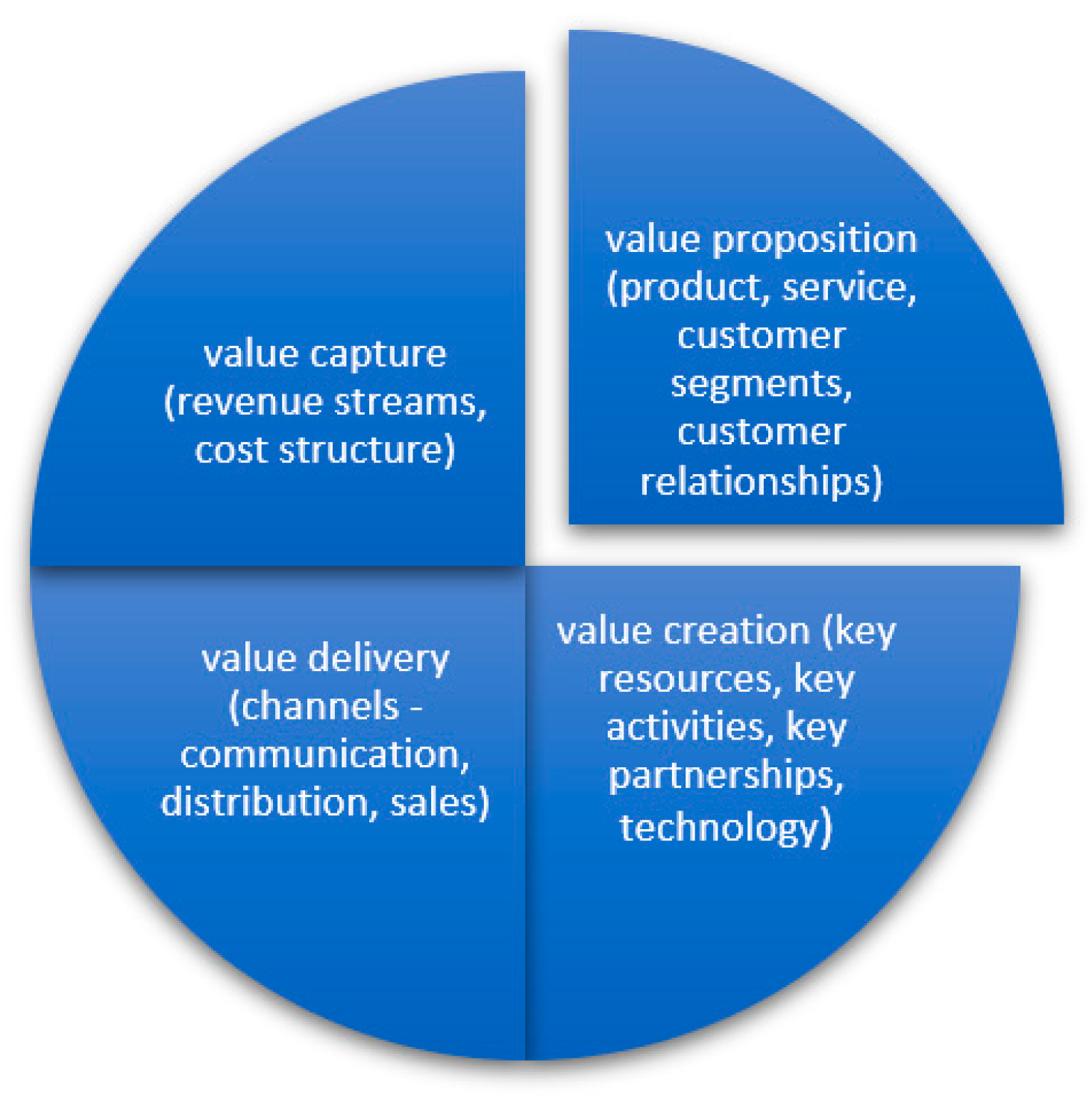
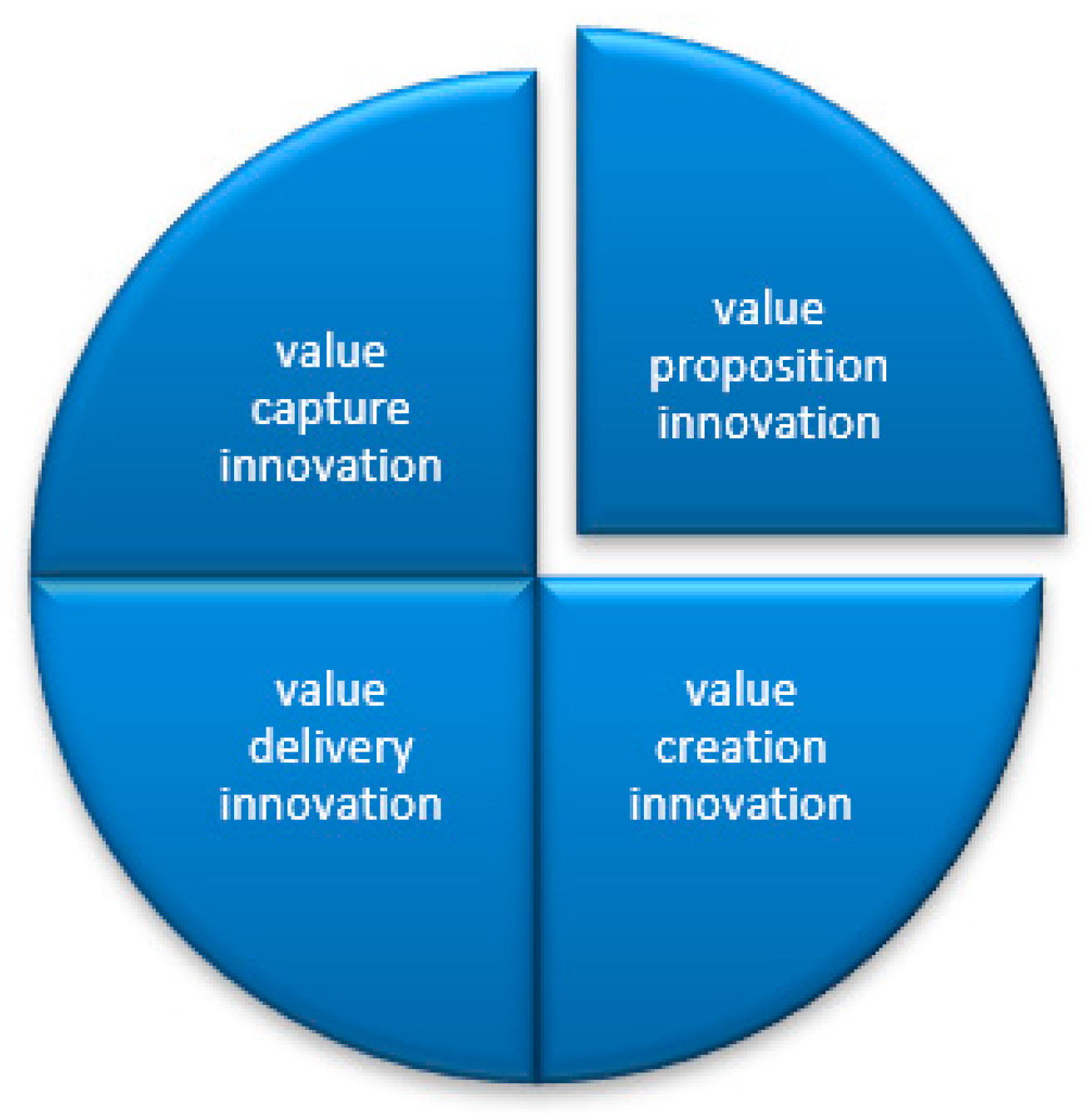
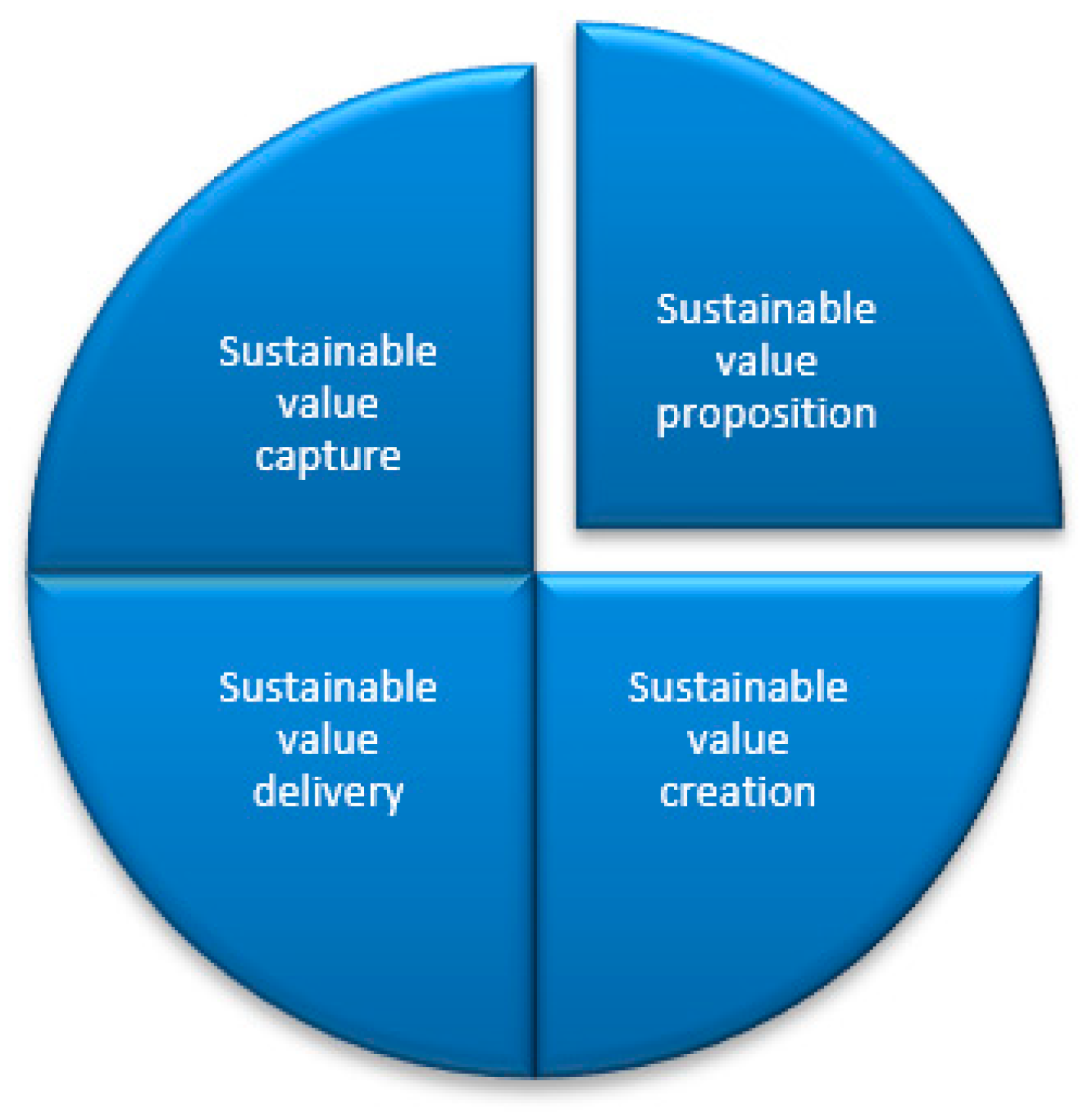
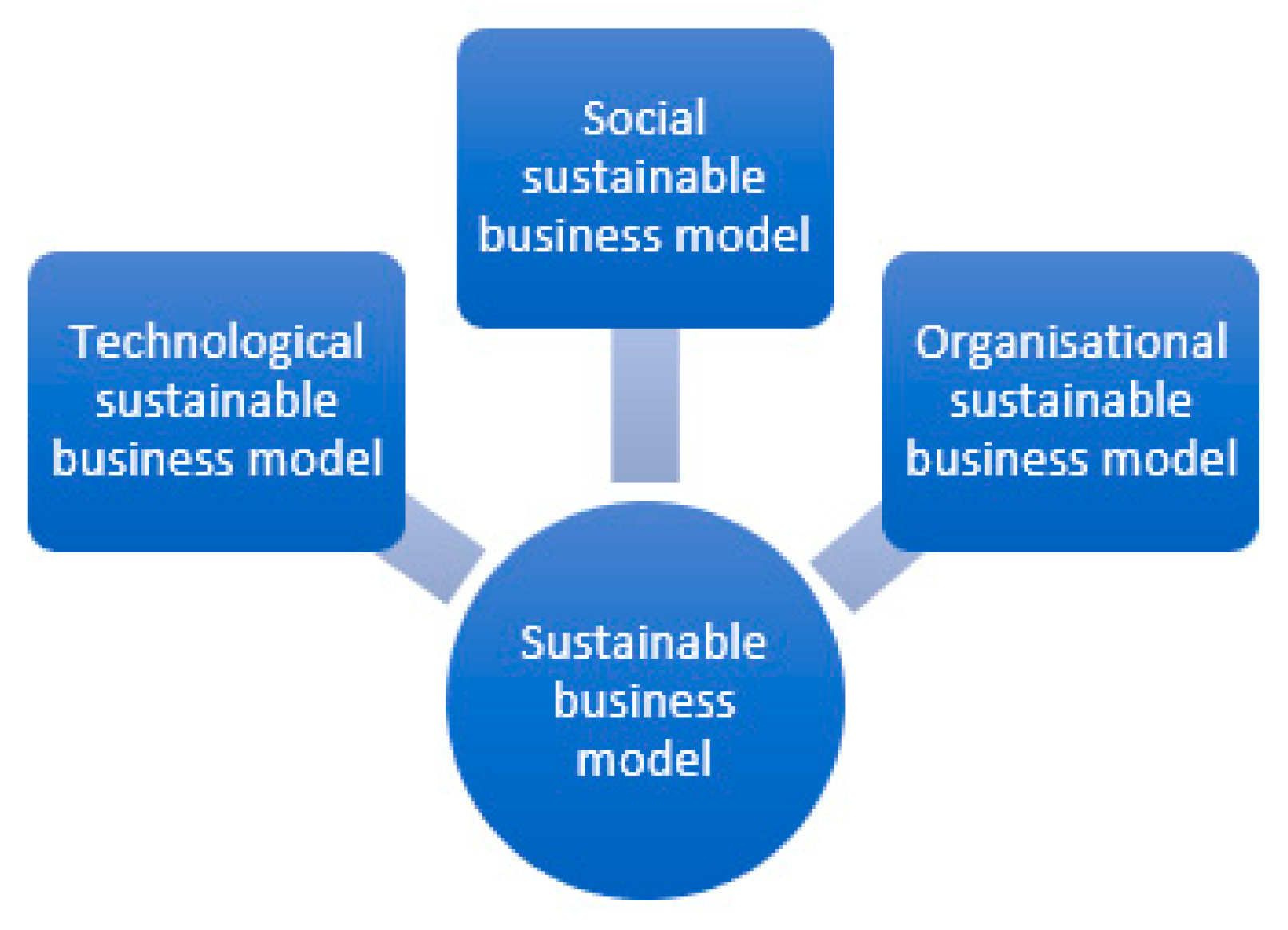
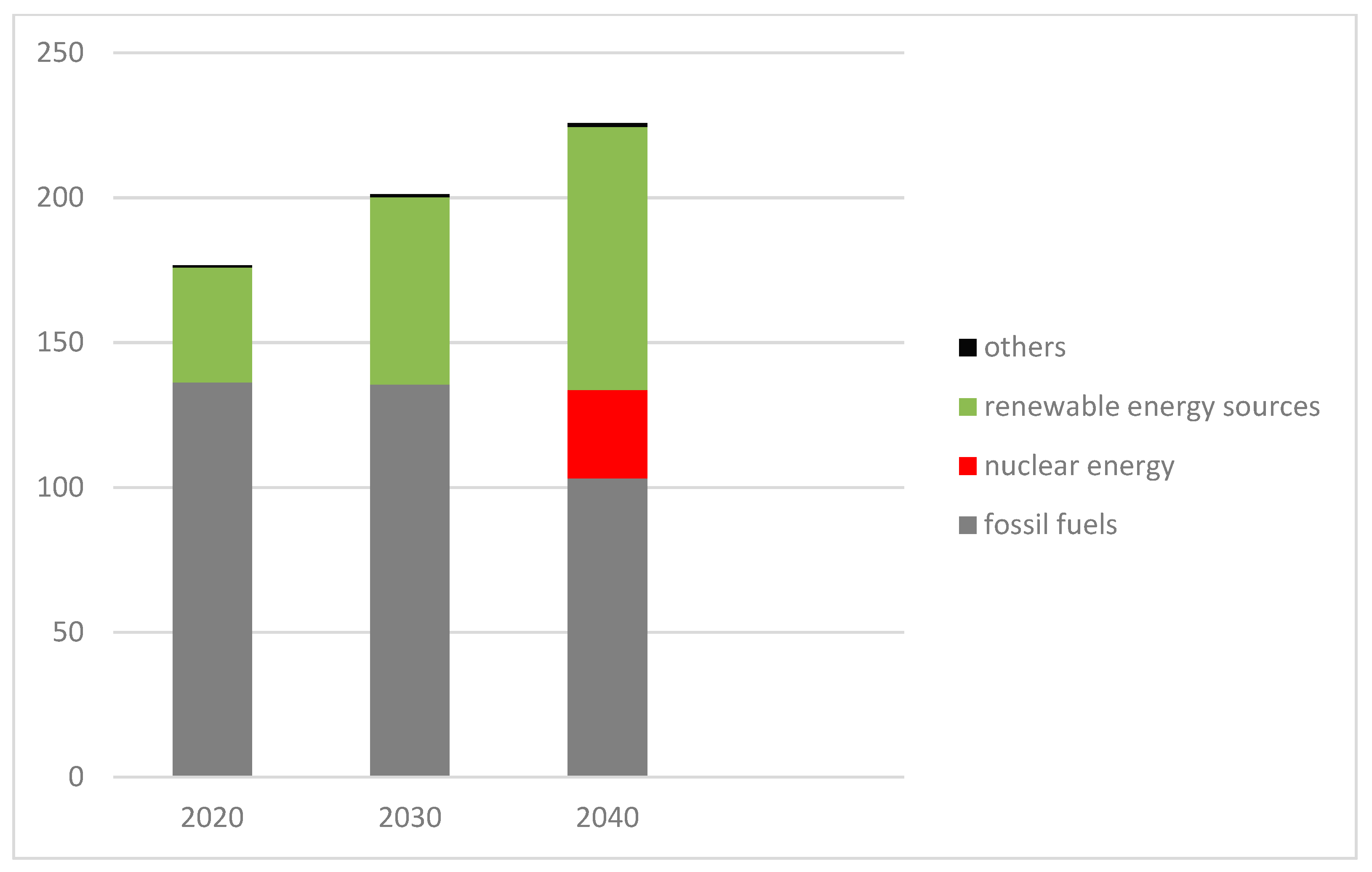
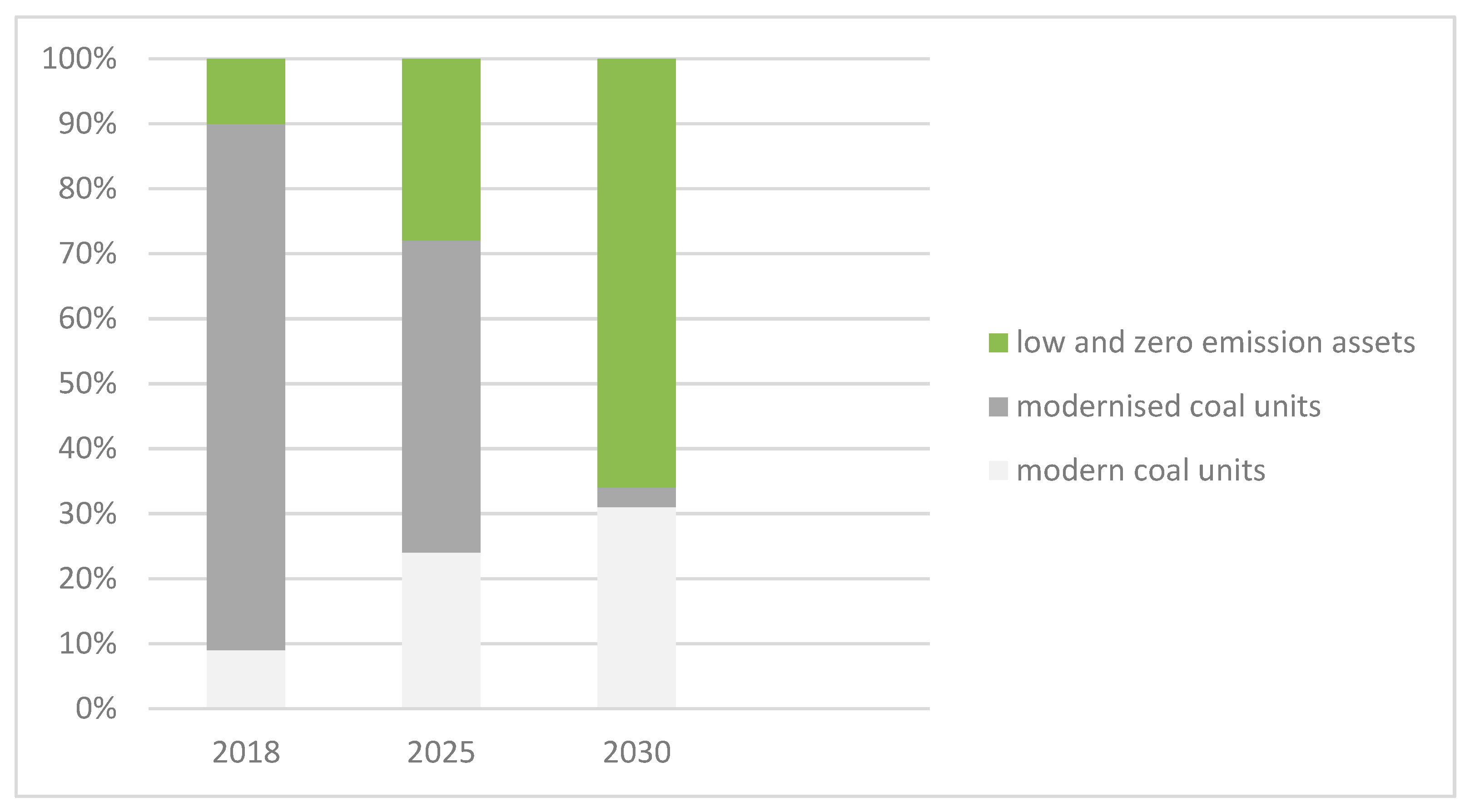
| Value Proposition | Value Creation | Value Delivery | Value Capture |
|---|---|---|---|
| Electricity, gas, heat, coal, limestone. Individual, business and institutional customers. Customer relations—from personal to automated. | Capital: financial, natural, productive, human, intellectual, social. Mining, manufacturing, renewable energy sources (RES), heat, distribution, trade, sales. Organisation of business processes within the vertically integrated capital group. Traditional production technologies and modern production technologies. | Communications, distribution and sales are handled by companies within the Tauron Capital Group | Sale of coal, sale of generated electricity and heat, sale of electricity distribution services, wholesale and retail sale of electricity and gas. Cost of goods, materials and services sold, selling and general administrative expenses, costs of other operating activities, costs of financial activities |
| Tauron Group Strategy |
| Actions aimed at optimising the Tauron Group’s mining and heating assets. Actions aimed at shutting down old coal units. Retaining modern conventional units in the structure of generation assets. Development and expansion of low- and zero-emission generation assets (focus on renewable energy sources). Actions aimed at developing new business in the Distribution segment. |
| Tauron Group Policy for the Environment (Selected Principles) |
| Compliance with environmental legislation. Sustainability throughout the supply chain. Minimisation of environmental impact. Protection of nature, biodiversity. Circular economy. Energy efficiency. Efficiency in water resources management. Environmentally-friendly products and services. Cooperation with stakeholders for the benefit of the environment. |
| Tauron Group Climate Policy (Selected Climate Policy Priorities) |
| Measures to limit global warming (selected priorities: energy efficiency, reduction of energy intensity, reduction of greenhouse gas emissions, development and use of low- and zero-carbon technologies and renewable energy sources, new environmentally-friendly activities and investments, collaboration with stakeholders for the benefit of the climate, promotion of climate-neutral mobility, eco-mobility and sharing economy). Adaptation to climate change (selected priorities: adaptation of business assets to climate change, cooperation with stakeholders, assessment of new activities and investments through the prism of climate change risk, climate-friendly products and services, climate-compatible products and services, low-carbon business, climate-resilient business, low-carbon revenue) |
Publisher’s Note: MDPI stays neutral with regard to jurisdictional claims in published maps and institutional affiliations. |
© 2022 by the author. Licensee MDPI, Basel, Switzerland. This article is an open access article distributed under the terms and conditions of the Creative Commons Attribution (CC BY) license (https://creativecommons.org/licenses/by/4.0/).
Share and Cite
Samborski, A. The Energy Company Business Model and the European Green Deal. Energies 2022, 15, 4059. https://doi.org/10.3390/en15114059
Samborski A. The Energy Company Business Model and the European Green Deal. Energies. 2022; 15(11):4059. https://doi.org/10.3390/en15114059
Chicago/Turabian StyleSamborski, Adam. 2022. "The Energy Company Business Model and the European Green Deal" Energies 15, no. 11: 4059. https://doi.org/10.3390/en15114059
APA StyleSamborski, A. (2022). The Energy Company Business Model and the European Green Deal. Energies, 15(11), 4059. https://doi.org/10.3390/en15114059






